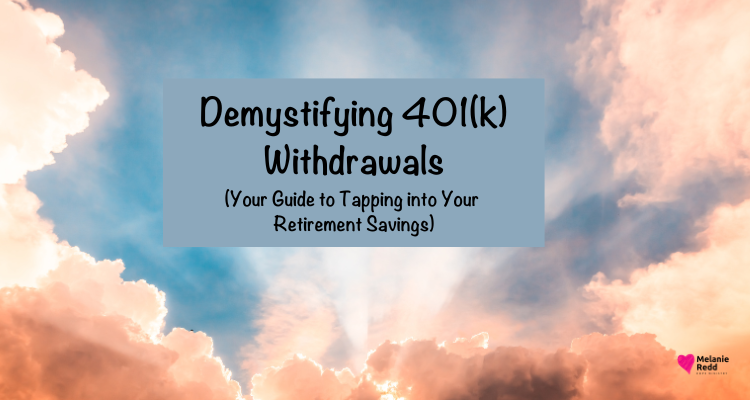Demystifying 401(k) Withdrawals

Demystifying 401(k) Withdrawals (Your Guide to Tapping into Your Retirement Savings)
So, you’ve been diligently squirreling away funds in your 401(k), prepping for the golden years when you can kick back, and relax on a beach somewhere.
But life doesn’t always stick to the script, does it? Sometimes you hit a snag, like unexpected medical bills, or a down payment on a house, or maybe you’re just itching to start that business you’ve been dreaming about. Whatever the reason, you might find yourself wondering: when can you withdraw from 401K?
Fear not, my friend. In this guide, we’re going to delve into the nitty-gritty of 401(k) withdrawals. We’ll explore when you can tap into your retirement savings without getting slapped with hefty penalties, the different types of withdrawals available, and the factors you should consider before leaping. So grab a cup of coffee (or tea, if that’s more your style), and let’s dive in!
Understanding the Basics: What Exactly is a 401(k) Plan?
Before we jump into the withdrawal rules, let’s do a quick refresher on what a 401(k) is. Essentially, it’s a retirement savings plan sponsored by your employer. You contribute a portion of your pre-tax paycheck into the account, and often, your employer will match a percentage of your contributions (hello, free money!).
The beauty of a 401(k) lies in its tax advantages. Not only do your contributions lower your taxable income, but your investments also grow tax-deferred until you start withdrawing them in retirement. Pretty sweet deal, right?
Demystifying 401(k) Withdrawals – When Can You Withdraw from Your 401(k)?
Ah, the million-dollar question (or should I say, the retirement-savings question). The short answer is: it depends. The long answer? Well, that’s what we’re here to unpack.
Age 59½: The Magic Number
In general, the IRS imposes a penalty if you withdraw funds from your 401(k) before you reach the ripe old age of 59½. Why such an oddly specific age? Beats me, but that’s the rule.
Once you hit this milestone, you’re free to start making withdrawals without facing any pesky penalties. Hallelujah! Keep in mind, though, that withdrawals are still subject to income tax because Uncle Sam always wants his cut.
Separation from Service: When You Bid Adieu to Your Employer
But what if you decide to hang up your work boots before hitting the big 5-9½? Well, there’s good news on that front too. If you separate from your employer (whether due to retirement, quitting, or getting laid off) once you’ve reached the age of 55 (or older), you can start dipping into your 401(k) without incurring the early withdrawal penalty. Score!
Hardship Withdrawals: When Life Throws You a Curveball
Life has a way of throwing us curveballs when we least expect it. If you find yourself facing financial hardship – think hefty medical bills, imminent foreclosure, or funeral expenses – you may qualify for a hardship withdrawal from your 401(k).
Now, before you get too excited, know that hardship withdrawals aren’t a walk in the park. You’ll need to prove to the IRS that you’re experiencing an “immediate and heavy” financial need, and even then, you’ll likely still owe income taxes on the withdrawn amount, plus a 10% early withdrawal penalty. Ouch.
Roth 401(k) Contributions: A Different Ballgame
If you’ve been stashing your cash in a Roth 401(k) – where you make contributions with after-tax dollars – the rules for withdrawals are a tad different. Since you’ve already paid taxes on your contributions, you can withdraw them (plus any earnings) tax-free once you hit age 59½ and have had the account for at least five years. No penalties, no fuss. Pretty sweet deal, huh?
Demystifying 401(k) Withdrawals – Factors to Consider Before Making a Withdrawal
Now that you know when you can withdraw from your 401(k), it’s time to ask yourself: should you? Before you rush to raid your retirement piggy bank, consider these factors:
Your Future Financial Needs
Sure, that shiny new sports car might be calling your name, but before you make any impulsive decisions, think about your future financial needs. Will tapping into your 401(k) today jeopardize your retirement lifestyle tomorrow? It’s a delicate balancing act, my friend.
Tax Implications
Remember, Uncle Sam always wants his cut. Depending on the type of 401(k) you have and when you make withdrawals, you could be on the hook for income taxes and early withdrawal penalties. Crunch the numbers and weigh the pros and cons before making any moves.
Alternatives to Consider
Before you resort to raiding your retirement savings, explore alternative sources of funding. Could you take out a low-interest loan, negotiate a payment plan, or tap into other savings accounts? Exhaust all options before pulling the trigger on a 401(k) withdrawal.
Special Circumstances: Unique Situations That May Allow for Withdrawals
Life doesn’t always fit neatly into the IRS’s rulebook, and sometimes, special circumstances arise that warrant tapping into your 401(k) before the standard withdrawal age. While these situations are exceptions rather than the norm, it’s worth knowing your options:
Disability:
If you become totally and permanently disabled before reaching age 59½, you may qualify for an exemption from the early withdrawal penalty. The IRS defines total and permanent disability as being unable to engage in any substantial gainful activity due to a physical or mental condition. While this exemption provides relief from the penalty, you’ll still owe income taxes on the withdrawn amount unless you have a Roth 401(k).
Qualified Domestic Relations Order (QDRO):
In the unfortunate event of a divorce, a court may issue a Qualified Domestic Relations Order (QDRO) to allocate a portion of your 401(k) to your ex-spouse as part of the divorce settlement. Under a QDRO, your ex-spouse can withdraw their share of the 401(k) without incurring the early withdrawal penalty, although they’ll still owe income taxes on the distributed amount.
Military Service:
Members of the military may have unique circumstances that necessitate early access to their retirement savings. If you’re called to active duty for at least 180 days, you may be eligible to make penalty-free withdrawals from your 401(k). Additionally, reservists ordered or called to active duty for an indefinite period can also qualify for penalty exemptions.
Medical Expenses:
While medical expenses can qualify as hardship withdrawals, there’s another provision that may offer relief: the medical expense deduction. If you itemize deductions on your tax return and your medical expenses exceed a certain percentage of your adjusted gross income (AGI), you may be able to deduct them from your taxes. While this doesn’t directly affect your 401(k) withdrawal, it’s a valuable tax benefit to consider when facing substantial medical bills.
Demystifying 401(k) Withdrawals – Conclusion: Proceed with Caution
And there you have it, folks – your guide to navigating the murky waters of 401(k) withdrawals. While the allure of quick cash might be tempting, it’s crucial to approach withdrawals with caution. Consider your future financial goals, weigh the tax implications, and explore alternative options before making any decisions. Your future self will thank you for it.
Were you encouraged by what you read?
Then, would you share this article with a friend, co-worker, or family member?
Or, maybe you can send it to a friend or family member?
This blog occasionally uses affiliate links and may contain affiliate links.
Additionally, Melanie Redd is a participant in the Amazon Services LLC Associates Program.
This is an affiliate advertising program designed to provide a means for sites to earn advertising fees. These are earned by advertising and linking to amazon.com.
Also, for more on my disclosure policy, click HERE.
© Melanie Redd and Hope Ministry, 2024. Unauthorized use and/or duplication of this material without express and written permission from this blog’s author and/or owner is strictly prohibited.
Further, excerpts and links may be used, provided that full and clear credit is given to Melanie Redd and Hope Ministry.
Please give appropriate and specific directions to the original content.



0 Comments